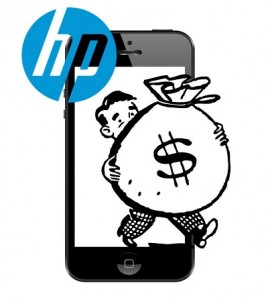Carta Worldwide to provide HP with efficient and secure mobile payments technology
Hewlett-Packard (HP) has chosen Carta Worldwide, a developer of transaction technology, to deliver new mobile payments services to its customers. These services will be delivered to those in Europe, Africa, the Middle East, Asia, and Canada. Carta’s cloud-based payments and tokenization technology will be used to help HP meet the growing demands for mobile payments support that are coming from consumers. This technology may also introduce more security to the payments sector.
Tokenization may help make mobile transactions significantly more secure
HP suggests that Carta is one of the only companies that is capable of offering everything its customers need for convenient and secure mobile payments. The company’s tokenization technology, in particular, is considered quite robust, and may provide consumers with a greater sense of security when it comes to making a transaction with their mobile devices. Tokenization involves using digital tokens in place of financial data, and these tokens can be used to authenticate a transaction.
Mobile payments continue to gain prominence among consumers and businesses alike
 Mobile payments are becoming more popular among consumers, but many people still have concerns about the security of making a transaction with a smartphone or tablet. These security concerns have slowed the adoption of mobile payments among consumers as well as retailers. Companies like Carta and HP have been looking for ways to lay these security concerns to rest and cloud-based payment systems combined with tokenization may be an adequate solution to this problem.
Mobile payments are becoming more popular among consumers, but many people still have concerns about the security of making a transaction with a smartphone or tablet. These security concerns have slowed the adoption of mobile payments among consumers as well as retailers. Companies like Carta and HP have been looking for ways to lay these security concerns to rest and cloud-based payment systems combined with tokenization may be an adequate solution to this problem.
Carta intends to provide HP with future-proof technology that will allow it to compete more aggressively in the mobile commerce space
Carta’s services allow its customers to quickly deploy a wide range of mobile payments solutions. The company believes that its technology will provide HP with a “future-proof” roadmap for its plans in the mobile payments space. HP will, of course, face competition from other companies that have their own interests in mobile commerce, but providing consumers with a safe way to purchase products with a smartphone may win the company some significant favor.
Visa believes that digital tokens are making consumers more comfortable with mobile payments
Tokenization is a leading driver behind the adoption of mobile payments, according to Visa. The company’s global head of mobile products, Bill Gajda, believes that the introduction of tokenization is making the mobile payments space more secure. As such, consumers are more likely to participate in mobile commerce and businesses are feeling more comfortable about protecting the information of these consumers. More platforms are expected to adopt tokenization in the coming years, with the new Samsung Pay service supporting digital tokens when it launches later this year.
Digital tokens serve as a way to protect the financial information of consumers
Tokenization is a relatively new practice in the mobile commerce space. The process involves attributing digital tokens to financial information at the time a mobile transaction is made. Most mobile payments platforms require users to link their credit or debit card information so they can be used. When a transaction occurs, a sequence of numbers is attributed to this information, which can be used to authenticate a payment. Through this process, no financial information is actually passed from consumer to merchant, making the transaction sector for all parties involved.
Mobile payments space may grow more secure through the use of digital tokens
 Visa believes that tokenization will be a boon for the mobile payments sector, which has had a struggle with security issues over the past few years. Visa believes that more platforms will embrace tokenization as more consumers become involved in mobile payments. Apple Pay is one of the most prominent services that supports tokenization. Apple partnered with Visa in order to make use of digital tokens, which has significantly improved Apple Pay’s already considerable security features.
Visa believes that tokenization will be a boon for the mobile payments sector, which has had a struggle with security issues over the past few years. Visa believes that more platforms will embrace tokenization as more consumers become involved in mobile payments. Apple Pay is one of the most prominent services that supports tokenization. Apple partnered with Visa in order to make use of digital tokens, which has significantly improved Apple Pay’s already considerable security features.
Samsung to use Visa’s tokenization service for its new payment platform
Samsung will also be working with Visa to make digital tokens possible. Samsung Pay is slated to launch later this year and will compete with other mobile payments services that are available on the market. The success of the platform may draw yet more attention to the use of digital tokens and encourage other companies interested in mobile commerce to make use of tokenization as well.
 Mobile payments are becoming more popular among consumers, but many people still have concerns about the security of making a transaction with a smartphone or tablet. These security concerns have slowed the adoption of mobile payments among consumers as well as retailers. Companies like Carta and HP have been looking for ways to lay these security concerns to rest and cloud-based payment systems combined with tokenization may be an adequate solution to this problem.
Mobile payments are becoming more popular among consumers, but many people still have concerns about the security of making a transaction with a smartphone or tablet. These security concerns have slowed the adoption of mobile payments among consumers as well as retailers. Companies like Carta and HP have been looking for ways to lay these security concerns to rest and cloud-based payment systems combined with tokenization may be an adequate solution to this problem.
 Visa believes that tokenization will be a boon for the
Visa believes that tokenization will be a boon for the 